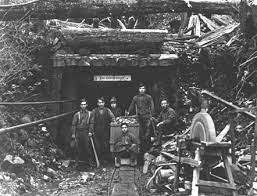Welcome to my first post about working life in the 1890's, I found a book I have on the topic and have decided to use it to write a bit about the topic.
Back in the 1890's working life was hard and insecure, it was a decade of political change and economic uncertainty. Any gains made prior to then disappeared as depression hit and jobs became scarce. Many employers found themselves on the edge of bankruptcy so they cut employee numbers and lowered wages.
It is now believed by historians that about 29% of workers suffered unemployment during the worst years, between 1892 till 1894 before things started to slowly improve in the late 1890's.
Before European settlement, work for Aboriginals and Torres Strait Islanders was just part of their daily life. Their effective and appropriate use of the land determined their survival and spiritual well being.
Of course the impact of the white mans ways of working had a negative effect on their way of life causing brave but futile resistance. They had their land taken and were forced to work in the white man's way on pastoral and other properties.
From the start of white settlement in Australia working life for convicts, Aborigines and the majority of free settlers was extremely hard.
The first Governor Arthur Phillip, decreed that convicts should work an eleven-and-a half hours a day from sunrise to sunset in the summer.
As well as working for the Government on public works such as the construction of buildings and road-making, convicts were assigned to free settlers and at first there was little regulation of their working conditions.
Many of the free white settlers also had it hard with their working conditions while working for squatters and well to do employers.
The Master and Servant Act of 1828 attempted to regulate conditions but mainly in favour of the Masters.






As I recall, that was when we were in the depression that led to William Jennings Bryan's "Cross of Gold" speech.
ReplyDeleteMuy cierto es un buen análisis de las condiciones de trabajo y de ola época. Te mando un beso. Enamorada de las letras
ReplyDeleteHi there, hope you liked the post
DeleteMy grandfather was put into the labour market at 10, working in a Singer sewing machine factory. His parents had both died so he was very grateful to have a job. But the story still makes me feel very sad.
ReplyDeleteMy grandfather was working in coal mines at a very young age but at this moment I can't remember how old he was, I do remember when he was 14 he was injured in the mines and in hospital at the same time as his mother but his sister Joyce didn't want their mother to know he was hurt and in hospital.
DeleteWorking conditions were so awful years ago. In many parts of the world they still are. :(
ReplyDeleteI know there are still far to many countries with terrible working conditions
DeleteVery interesting Jo-Anne.
ReplyDeleteI think so, thanks for dropping by
Delete"...spiritual well being."
ReplyDeleteThis is the key to everything.
It is but how much early Aussies cared about our indigenous people is something for the most part bugga all
DeleteSo sad for the people living at that time.
ReplyDeleteBlessings, Jo-Anne!
Oh yeah I agree bloody hard times
Delete